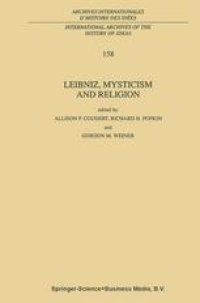
Ebook: Leibniz, Mysticism and Religion
- Tags: Religious Studies, History, Philosophy
- Series: Archives Internationales D’histoire des Idées / International Archives of the History of Ideas 158
- Year: 1998
- Publisher: Springer Netherlands
- Edition: 1
- Language: English
- pdf
Some scholars in the history of ideas have had a growing interest in examining Leibniz's many discussions ofvarious aspects of religion, Christian, Jewish and far eastern. Leibniz, with his voracious interest and concern for so many aspects of human intellectual and spiritual life, read a wide variety of books on the various religions of mankind. He also was in personal contact with many of those who espoused orthodox and non-orthodox views. He annotated his copies of many books on religious subjects. And he was working on schemes for reuniting the various Catholic and Protestant churches in Europe. Studies on Leibniz's views on Judaism, on the Kabbalah, on Chinese thought have been appearing over the last decades. It was decided by some of us that since there has been a growing interest in this side of Leibniz's thought it would be a good idea to bring together a group of scholars working on different aspects of Leibniz's views on religion, mysticism and spiritualism, in order to h~ve them present papers on their current researches, and to have the opportunity for lengthy discussion, formal and informal, in the most pleasant academic ambiance of the William Andrews Clark Library in Los Angeles. Under the sponsorship of the UCLA Center for Seventeenth and Eighteenth Century Studies, a workshop conference was held November 18-19, 1994.
This important, well-researched collection of essays will change many readers' perceptions of Leibniz and of the seventeenth century. Dealing with such subjects as Leibniz's occult sources, his interest in mysticism, Kabbalah, and Chinese philosophy, and his attitude towards enthusiasm, the authors provide new insights into Leibniz's thought and the cultural context in which he lived. The individual essays bring forward much in the way of new primary material, while at the same time conserving the valuable aspects of older commentators on Leibniz (Baruzi, Meyer, Loemker). The fact that the authors frequently disagree makes this an exciting collection that is bound to provoke discussion and debate. While this book will especially appeal to Leibniz scholars, it has much to recommend it to readers interested in the philosophy, theology, and science of early modern Europe.